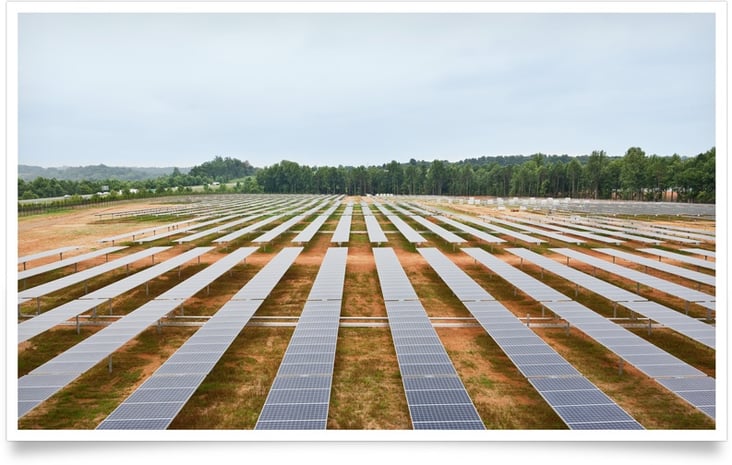
Solar panels at an Apple data center in North Carolina.
Here at Advanced Energy Perspectives, the trend has been unmistakable. Large, multi-million and multi-billion dollar businesses are choosing advanced energy over alternatives. From manufacturing giants like AEE member Siemens to consumer-facing brands like Apple, Nike, Starbucks, and Proctor & Gamble to tech companies like Google and Salesforce, major companies are committing to advanced energy technologies. Now, even more companies are joining in the fun. Plus, we have details on how more companies like these can make the same choice.
This week, 81 companies, including AEE members Apple, GE, IBM, Intel, Invenergy, Johnson Controls, Microsoft, and Siemens announced that they had signed the Act on Climate Pledge, which urges policymakers to take action to break down barriers to advanced energy. As Joe Kaeser, CEO of AEE member company Siemens said in a New York Times op-ed, “taking action is not just prudent — it’s profitable.”
For its part, Apple laid out plans earlier this year to entirely power its supply chain with advanced energy: solar, wind, biogas, fuel cells, geothermal, and small hydropower plants. For Apple, this commitment isn’t new: as of 2014, all of Apple’s U.S. data centers and corporate facilities are powered by renewable energy. But bringing its whole supply chain into the fold is no small feat: Wall Street Journal’s Digits blog reports that Apple’s suppliers use 60 times as much power as the company’s facilities. This week the company put its money where its mouth is and announced a 2GW advanced energy initiative in China.
The 2GW of advanced energy includes a commitment to build 200MW of solar itself, and the company is encouraging its manufacturing partners to get on board as well. Apple announced that it had completed two solar farms, which together represent 40 MW. Foxconn, the company that manufactures iPhones, has pledged to build 400 MW of solar by 2018. Greentech Media reports that Apple is accelerating its installations, with plans to bring 280 MW of advanced energy power generation online by Q4 2016 “through investments in Arizona, California, Nevada, North Carolina, Oregon and Sichuan province, China.”
Meanwhile, Proctor & Gamble announced that it would be running its factories on wind power. The consumer products giant, which makes everything from Downy laundry detergent to Luvs diapers, announced a partnership with EDF Renewable Energy to begin construction on a wind farm in Cooke County, Texas. The wind farm is expected to produce 3.7 GWh of electricity annually, which, according to the company, is more than it needs. “So we know that we’re going to be consuming less than what we’re putting into the grid,” Shailesh Jejurikar, president of P&G’s North American fabric care division, said in an interview with the New York Times.
Why has Proctor & Gamble, which mostly makes cleaning supplies, making the decision to run on wind? Jejurikar explains: “More and more, we find a very large number — call it two-thirds of consumers — looking to make some kind of contribution in the space, and hopefully not making trade-offs in value or performance.” In other words, the customer is always right – and today’s customer wants more than clean clothes. As for other companies making advanced energy commitments, Fortune Magazine points out that large companies’ commitments to advanced energy “sends a message to utilities and clean energy project developers that they are willing to be customers.” Well, message received!
As more and more companies are looking to buy the energy they want, such direct purchases are becoming the new normal. But it’s not as easy as it should be. AEE will discuss the policy barriers faced by corporate customers as they seek renewable energy for their operations in a free webinar next week: Corporate Renewables Goals: Procurement Options & Policy Barriers. Moderator Anna Giovinetto, AEE’s senior director for state policy, joins Peter Mostow, a partner at Wilson Sonsini Goodrich & Rosati and Ryan Cook, a consultant with Meister Consultants Group, to discuss the role state policy plays in creating opportunities for — or barriers to — additional market demand for renewables.
